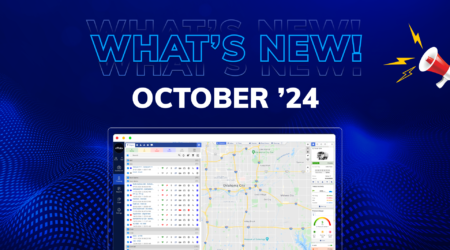10 Reasons to Invest in a Fleet Vehicle Tracking System
In modern business operations, the efficient management of fleets plays a pivotal role in ensuring seamless operations, cost-effectiveness, and customer satisfaction. At the heart of this management strategy lies the adoption of advanced technologies. Among these fleet vehicle tracking systems stand out as a cornerstone solution. But what exactly is a fleet vehicle tracking system, and how does it revolutionize fleet management practices?
What is a Fleet Vehicle Tracking System?
A fleet vehicle tracking system is also known as GPS tracking system or telematics solution. It is a sophisticated technology that enables businesses to monitor and manage their fleet of vehicles in real-time. It leverages a combination of GPS, cellular, and satellite technology to track the location, speed, and status of vehicles remotely. Additionally, these systems often integrate with other data sources such as vehicle diagnostics and driver behavior analytics. It provides comprehensive insights into fleet operations.
How Does it Work?
The functionality of a fleet vehicle tracking system revolves around a network of GPS satellites. It continuously transmits signals to receivers installed in vehicles. These receivers are commonly referred to as GPS trackers or telematics devices. It captures the signals and uses triangulation techniques to determine the precise location of the vehicle. This information is then transmitted to a centralized software platform via cellular or satellite communication networks. It is then processed and made accessible to fleet managers in real-time.
Key Components and Features:
GPS Tracking:
The core functionality of a fleet vehicle tracking system is GPS tracking, which enables businesses to monitor the location of their vehicles with pinpoint accuracy. This allows for efficient route planning, asset recovery in case of theft, and real-time monitoring of vehicle movements.
Real-Time Monitoring:
With real-time monitoring capabilities, fleet managers can track the status and performance of their vehicles as they move across various routes and destinations. This includes monitoring factors such as speed, fuel consumption, engine status, and driver behavior. It empowers managers to make informed decisions on the fly.
Geofencing:
Geofencing is a feature that allows businesses to define virtual boundaries or geographically restricted areas on a map. When a vehicle enters or exits these predefined zones, alerts are triggered. It enables businesses to monitor and manage vehicle movements more effectively.
Route Optimization:
Fleet vehicle tracking systems often come equipped with route optimization tools that analyze factors such as traffic conditions, road closures, and vehicle capabilities to generate the most efficient routes for drivers. This not only reduces fuel consumption and travel time but also enhances overall fleet productivity.
Driver Behavior Monitoring:
By tracking driver behavior metrics such as speeding, harsh braking, and idling, fleet vehicle tracking systems enable businesses to identify and address unsafe driving habits. This promotes safer driving practices, reduces the risk of accidents, and improves overall fleet safety.
Vehicle Diagnostics:
Many fleet vehicle tracking systems integrate with onboard vehicle diagnostics systems to provide real-time insights into vehicle health and performance. This includes monitoring parameters such as engine diagnostics, fuel efficiency, and maintenance schedules, allowing businesses to proactively address issues and minimize downtime.
Reporting and Analytics:
Comprehensive reporting and analytics tools allow businesses to analyze historical data, identify trends, and generate actionable insights into fleet operations. This includes metrics such as fuel consumption, driver performance, vehicle utilization, and maintenance costs, enabling businesses to optimize their operations and drive continuous improvement.
Reasons to Invest in a Fleet Vehicle Tracking System
Optimized Resource Allocation:
One of the primary advantages of a fleet vehicle tracking system is its ability to provide real-time insights into the location and status of your vehicles. This data allows fleet managers to optimize routes, assign tasks efficiently, and ensure that each vehicle is utilized to its fullest capacity. By minimizing idle time and reducing unnecessary mileage, businesses can extract maximum value from their fleet resources.
Enhanced Safety Measures:
Safety is a non-negotiable aspect of fleet management. With a vehicle tracking system in place, businesses gain visibility into driver behavior, enabling them to identify and address risky driving habits such as speeding, harsh braking, and rapid acceleration. By implementing proactive measures to improve driver safety, businesses can mitigate the risk of accidents, protect their drivers, and uphold their commitment to road safety standards.
Cost-Effective Operations:
In today’s competitive market, cost optimization is a top priority for businesses. A fleet vehicle tracking system offers a multitude of opportunities to trim expenses and improve cost-effectiveness. By optimizing routes, reducing fuel consumption, and minimizing vehicle wear and tear, businesses can achieve substantial savings in operational costs. Additionally, the ability to monitor vehicle performance in real-time enables proactive maintenance, preventing costly breakdowns and ensuring optimal efficiency.
Streamlined Operations:
Manual fleet management processes are inherently prone to errors and inefficiencies. By automating key tasks such as route planning, dispatching, and reporting, a vehicle tracking system streamlines operations and reduces administrative burden. This not only saves time and resources but also allows fleet managers to focus on strategic decision-making and business growth initiatives.
Real-Time Monitoring and Decision-Making:
In today’s dynamic business environment, agility is key to success. A fleet vehicle tracking system provides businesses with real-time visibility into their operations, enabling swift and informed decision-making. Whether it’s tracking deliveries, responding to service calls, or managing field personnel, businesses can rely on up-to-date information to adapt to changing circumstances, optimize resource allocation, and deliver exceptional service to customers.
Improved Customer Service:
Exceptional customer service is a cornerstone of business success. With a vehicle tracking system, businesses can enhance the customer experience by providing accurate ETA estimates. They can also proactively communicate with customers about delays or changes in schedule, and ensure timely delivery of goods and services. By consistently meeting or exceeding customer expectations, businesses can foster loyalty, drive repeat business, and maintain a competitive edge in the market.
Regulatory Compliance:
The transportation industry is subject to a myriad of regulations and compliance standards, ranging from hours of service rules to vehicle maintenance requirements. A fleet vehicle tracking system helps businesses ensure compliance with these regulations by maintaining detailed records of driver activity, vehicle inspections, and maintenance schedules. By staying compliant, businesses can avoid costly fines, penalties, and reputational damage.
Enhanced Security Measures:
Protecting valuable assets such as vehicles is paramount for businesses. A vehicle tracking system offers added security by enabling businesses to track the location of their vehicles in real-time. In the event of theft or unauthorized use, businesses can quickly locate the vehicle, initiate recovery procedures, and mitigate potential losses. Additionally, the system’s geofencing capabilities allow businesses to define virtual boundaries. They receive alerts if a vehicle deviates from its designated route, providing an extra layer of security.
Data-Driven Insights and Analysis:
A fleet vehicle tracking system generates a wealth of data. These data can be leveraged to gain valuable insights into business operations. By analyzing key metrics such as fuel consumption, vehicle utilization, and driver performance, businesses can identify trends, pinpoint areas for improvement, and make data-driven decisions to optimize their fleet operations. This analytical approach enables businesses to continuously refine their strategies, enhance efficiency, and stay ahead of the competition.
Scalability and Customization:
Whether businesses are managing a small fleet or a large-scale operation, a vehicle tracking system offers scalability and customization to meet their evolving needs. With flexible pricing plans and customizable features, businesses can tailor the system to align with their specific requirements. As their business grows, the system can easily scale to accommodate changes in fleet size, geographic coverage, and operational complexity, ensuring long-term viability and success.
Conclusion
In conclusion, investing in a fleet vehicle tracking system is not just about tracking vehicles; it’s about unlocking efficiency, enhancing safety, and driving business growth. By leveraging advanced technology and data-driven insights, businesses can optimize their fleet operations. They can reduce costs, improve customer service, and gain a competitive edge in the market. With the comprehensive features and capabilities offered by our advanced fleet management software, businesses can embark on a transformative journey towards operational excellence and sustainable success.





